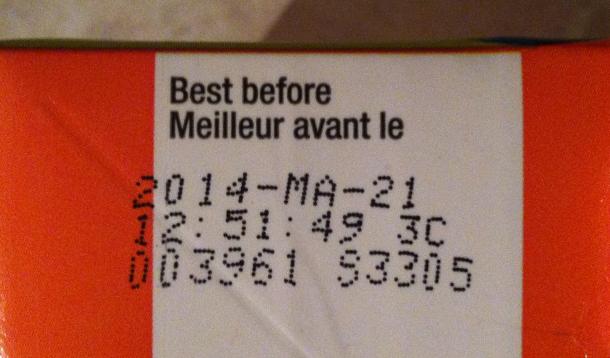
I check two things when I buy packaged food items: the ingredients list and the "best before" date. And I openly admit that I get a bit squeamish at the thought of eating an "expired" food item, even if it looks, smells, and tastes as fresh as ever. But the truth is, "best before," "use by," or "sell by" dates are not well regulated in North America. In fact, they are the food manufacturers best estimate of when their product will remain at its peak of freshness.
In other words, they mean nothing.
A study published by the Harvard Law School and the Natural Resource Defense Council reported recently that thousands of kilograms of food is wasted every year because of the false belief that "best before" dates (otherwise known as "durable life dates") are an indication of food safety. And in Canada, it is estimated that there is 27 billion dollars of food is wasted every year, and 50% of this happens in Canadian households. The Harvard study notes that we are not only wasting food and money, but also natural resources needed to get the food to our tables. By law in Canada, manufacturers are required to put "best before" labels on food that will spoil in less than 90 days and it is optional for food that will last longer than 90 days. These date labels are an estimation of when a product will retain its freshness (taste, smell, texture etc.). But again, it is not an indication of the safety of that food should it be consumed passed the "best before" date.
The problem is three-fold.
1. Most consumers assume that these dates are regulated and standardized and therefore assume that their food has spoiled and is no longer safe for consumption on and after the "best before" date. This is false. It may in fact be completely safe to eat long after the expiry date.
2. These dates are even more misleading when it comes to foods that have a long shelf or refrigerated life unopened, but then only last 7-10 days after they've been opened. It may indicate this somewhere on the package in small print (if you aren't looking for it, you probably won't see it). For example, refrigerated soy milk has an expiry date listed, but this date is only applicable to an unopened, sealed container. When the container is opened, it is only good for 7-10 days in the refrigerator (or thereabouts). You'd be surprised how many people keep opened soy or almond milk in the fridge for months.
3. Lastly, if a food package has been compromised in any way (the seal was broken somehow), or if it has been kept—for any length of time—at an inappropriate temperature, it may spoil way before the "best before" date.
For these reasons, we should not solely depend on "best before" dates to dictate when we throw out our food.
But then there are people who completely ignore "best before" dates and keep food items LONG after they have expired. I'm talking scrape-the-mold-off-yogurt-and-eat-the-rest kind of people. Yes, people do that. My Food Microbiology professor put the fear of God into me in University when it comes to food mold, so I always chuck it, with a few exceptions. Soft foods are particularly worrisome because mold—and the dangerous mycotoxins that it releases—can travel throughout soft food items such as yogurt, soft cheese, sour cream, sauces, breads, and soft fruits and vegetables. If mold is found on these foods it should absolutely be tossed. You can usually get away with cutting mold off of hard cheeses and hard, firm veggies or fruits as long as you cut at least one inch from the mold on all sides. But when it comes to food mold, play it safe. Contrary to what some may believe, food mold will not make your immune system stronger and is not "harmless."
Bottom line?
Until "best before" dates become standardized and regulated, take them with a grain of salt. Use them as a ball park indicator of freshness, but trust your senses first and foremost. If it looks, smells or tastes off, chuck it. If there is ANY mold on soft foods, do not eat it and throw it away. If there is mold on hard cheese or hard fruits or veggies, make sure that you cut the mold off (and cut an inch all the way around it) before eating it.
Would you eat expired food? Trader Joe's is offering a new concept where you can buy food past its expired date for a discount price.